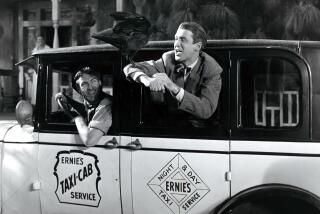Classic Hollywood: ‘It’s a Wonderful Life’ finally gets the restoration it deserves
- Share via
For years, Frank Capra’s cherished 1946 “It’s a Wonderful Life” wasn’t treated with any respect. Shabby prints were released on home video and shown on cable. Adding insult to injury, it was colorized.
But times have changed.
The Christmas favorite tells the story of George Bailey (Jimmy Stewart), an Everyman saved from suicide by an angel named Clarence (Henry Travers). George is shown what life would have been like for his wife (Donna Reed) and his hometown of Bedford Falls if he had not been born.
There have been attempts at restoring the original film, but nothing on the scale of Paramount Pictures’ new 4K digital restoration, which was released this week in time for the holidays.
“It’s a Wonderful Life” is the first black-and-white title to be released in Paramount’s 4K ultra high definition, which features sharper and brighter images enhancing the clarity of the image. The painstaking restoration process took six months to complete.
“I think it’s sort of wonderful that people have watched it in all iterations,” said Andrea Kalas, senior vice president of the Paramount archives. “The fact that people have not been able to let this movie go is a tribute to how great it is.”
Though it’s become a holiday perennial, “It’s a Wonderful Life” didn’t have a spectacular life at the box office when it was originally released, failing to recoup its cost because the film was so expensive to produce. It was rediscovered on television in the 1970s when the copyright expired due to a technicality. By that time, however, George, Clarence and the bucolic Bedford Falls were mere cinematic shadows of their former selves.
And for good reason. “It’s a Wonderful Life” had several owners over the decades.
Capra’s independent motion picture company, Liberty Films, made “It’s a Wonderful Life,” which was released through RKO. The film was then sold to various entities. “It ended up in the Republic library, and when Viacom and Paramount acquired the Republic library, it was one of the films that was moved to us,” said Kalas.
“ ‘It’s a Wonderful Life’ is a movie that we’re sort of constantly checking on because it is one of the highlights of our collection,” said Laura Thornburg, executive director of preservation at Paramount. “So the movie is never far from our minds. We are always checking to see how the negative is doing and if there is any deterioration.”
Despite its checkered history, 13 out of the 14 reels of the film’s original negative have survived.
“We are so very, very happy that we have the material to work with it,” said Thornburg, “Everybody was on their A-game when they made this, whether it was the people who did the sound or cinematography.” Indeed, the film earned five Oscar nominations, including best film, director and actor.
Still, the negative showed signs of deterioration. “Essentially, 50% of the reels that remain had some measure of deterioration, mostly at the ends of the beginnings of the reel,” said Thornburg.
Because they had two other elements made seven decades ago from the original camera negative, they were able to digitally replace the deterioration. According to Thornburg, that enabled them to “make intelligent choices and choices that would have been sympathetic to what Capra would have wanted.”
More to Read
Only good movies
Get the Indie Focus newsletter, Mark Olsen's weekly guide to the world of cinema.
You may occasionally receive promotional content from the Los Angeles Times.











